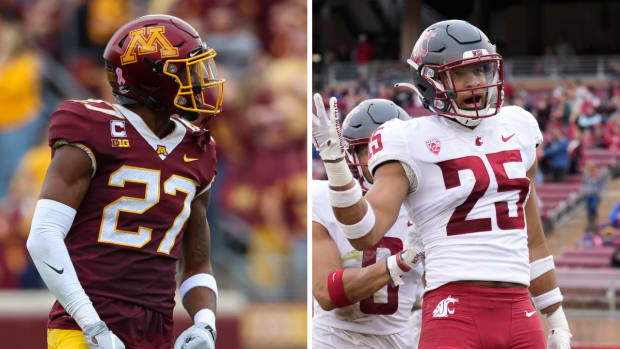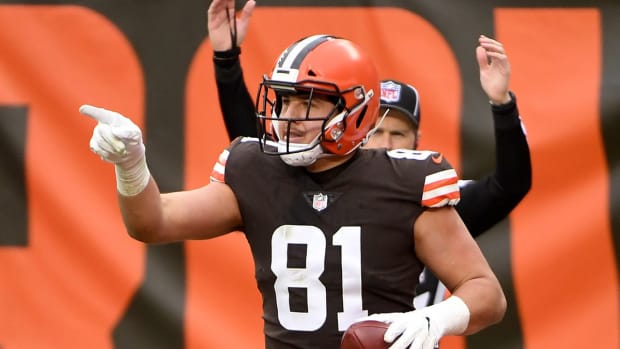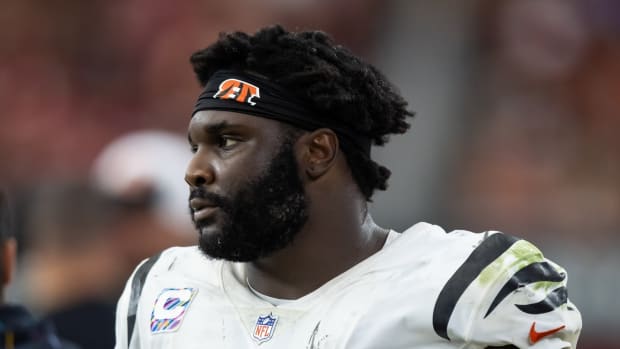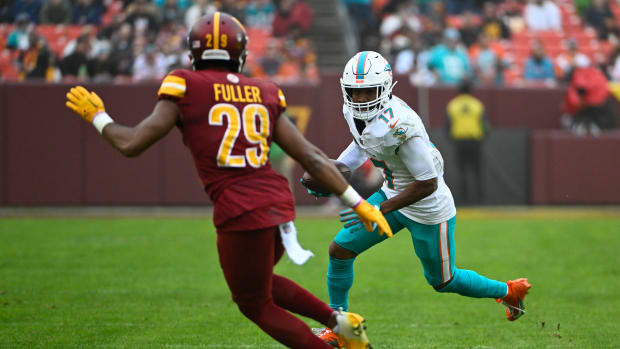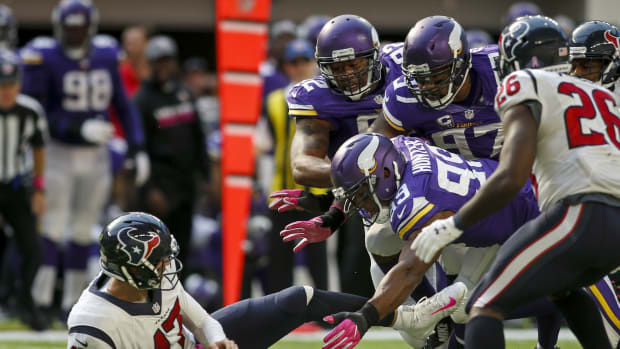Opinion: With the Browns Investigation, the NFL Just Approved a Manual for Tanking
Editor’s note: This is an opinion piece based on information uncovered in Sports Illustrated’s investigation into Hue Jackson’s claims that he was incentivized to lose games while he was head coach of the Browns.
In the footnote section of a letter NFL commissioner Roger Goodell wrote to Browns owner Jimmy Haslam upon the conclusion of the league’s investigation into Hue Jackson’s tanking allegations this week, Goodell wrote (emphasis mine): “There is no merit to the suggestion that offering incentives to win a certain number of games violates Article 9.1(C)(8) of the NFL Constitution and Bylaws, which prohibits bonuses to coaches for winning particular games against particular opponents.”
One point of contention in Jackson’s claims that has not yet been reported is that the Browns, after scrapping an incentive structure that rewarded the head coach for draft capital and salary-cap space carryover, installed a new bonus system—negotiated between Haslam and Jackson’s agent via email (it’s unclear whether it was ever submitted to the NFL for approval)—that rewarded Jackson for wins (“3 wins - $100K” up to “7 wins - $500K.”).
Goodell’s is a noteworthy clarification because there are some agents and advisers who work on NFL coaching contracts who have not interpreted the rule as such. One coaching agent I spoke to said that they always understood the NFL’s rule on incentives for coaches to mean that you can reward a coach financially for making the playoffs—since there is additional revenue that comes with additional games—but not for winning a specific number of games. One agent I spoke to said you can put a win total in their contract, while a third said they’ve only worked on contracts that offer bonuses for the postseason because isn’t that the goal of every team at the beginning of the year anyway? A fourth added that nothing existing either inside or outside of contracts would surprise them.
Indeed, in the NFL’s constitution—Article 9.1(C)(8)—the wording is vague and certainly open to interpretation: “a team cannot offer to pay a player or coach and no player or coach may receive any bonus, money, or thing of value for winning any game played in the League.”
This is one small window into an act of contortionism the league can perform in order to tamp down questions (especially notable with the Brian Flores lawsuit looming). In our investigation of Jackson’s claims, the NFL saw a bonus table that offered Jackson additional cash for “making 11 draft picks, and five in the first three rounds” and “rank in the bottom quarter of cash spend, carry over at least 15% of the league cap” and deemed it “a club acting with integrity to develop and implement a long-term plan to build and maintain a successful team and to win every game that it played.” In the letter from Goodell to Haslam, the commissioner noted the Browns’ record before Jackson’s arrival, and wrote: “a significant multi-year program was necessary” to make the Browns competitive.
Worded that way, it is reasonable that the NFL came to their “nothing to see here” conclusion. In fact, there is nothing inception-level mind-blowing about the NFL’s findings, if you read the book the way they lay it out. However, when looked at another way—wait, you’re paying a coach extra money if the team earns extra draft picks in the first three rounds and there are really only a few ways to do that—one might see a problem, especially for a league in the nascent stages of a very lucrative relationship with multiple sports betting partners.
Regardless, the league’s actions—the investigatory findings, Goodell’s clarification of the per-win bonus rule—have set the parameters of future endeavors from owners and front offices who may set out to build a similar program.
Basically, the league is saying it’s O.K. to pay a coach for winning a certain number of games. It’s O.K. to pay them to accrue more draft picks. It’s O.K. to pay them for spending less on the roster. It’s fine to do all of this, so long as there seems to be a general theme of eventual forward progress involved. The best part about this for the league is that coaching contracts are often kept under lock and key, unlike the players they manage, whose contractual details can be uncovered by the lay fan after a few short minutes on Google.
In the NFL’s letter to Haslam, they noted that the Browns signed “significant free agents” during the Jackson years as evidence of their desire to eventually win. They were seemingly referring to Kevin Zietler, J.C. Tretter, Kenny Britt and Jason McCourty in 2017, who were brought in during Jackson’s second year. In ’16 and ’17, respectively, the Browns ranked last and second-to-last in total salary-cap spending. In ’16, Jackson’s first year, the Browns’ most prominent signings were Don Jones, Darius Jennings, Tank Johnson, Raheem Mostert and Terrelle Pryor.
So what we have is a kind of basic set of guidelines for teams looking to rebuild, which is convenient given that the NFL is preparing for a much more significant legal battle involving alleged tanking. Don’t dip below the Cleveland line or else you might find yourself in actual trouble.
Beyond the outcome of the Flores case, it will be interesting to see how the league’s findings change the way coaches, general managers or players behave. For example, if I were a free agent looking at various options on the open market, I would ask my agent to do some digging and find out if my coach has any kind of pick accrual bonus in his contract or cap-shaving incentives because I may eventually be a casualty. If I were a head coach interviewing for a job that offered incentives for draft pick accrual and lower salary cap spending, I might think twice about taking the opportunity (most agents we spoke to said they would not have accepted Jackson’s contract but acknowledged that if their client had no other options they would have no choice, which is an interesting perspective to keep in mind as we look at hiring trends around the league).
In the spirit of fairness, it might behoove the NFL to make any of these arrangements public in the future since they have now blessed them as acceptable. A coaching or GM contract should be just as public and attainable as a player’s contract. This way, a lay person betting on a late-season tilt coached by a person who stands to make an additional $90,000 if the team has an extra pick in the third round can take that perspective into account. This way, a veteran hoping to make it to his next contract knows the additional possible motivations behind their coach’s decision-making.
Tanking is not legal in the NFL just like tax evasion is not legal. However, in both cases, there are certain avenues with which you can arrive at a similar goal through acceptable means. This week, the NFL has laid out their tax code in regards to roster builds. Will anyone dive into the fine print?
Gary Gramling contributed reporting to this story
More NFL Coverage:
• Investigation: Inside the Tanking Allgations Against the Browns
• The NFL Has an Imagination Problem at QB
• Mailbag: Who’s the Top Pick of the 2023 Draft?
• Inside Howie Roseman’s Process of Swapping Picks

































